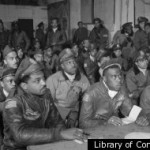We’d like to share the story of one of the true heroes we encountered in the Legacy Project.  We heard many accounts of overcoming adversity and discrimination, but no interviewee was more inspiring than Hiram Mann (pictured here in World War II). Hiram had to fight to find the work he loved, overcoming racial prejudice along the way. The struggle and the rewards of his 90 years were encapsulated in his first words in our interview: “I was one of the original legendary Tuskegee Airmen.”
We heard many accounts of overcoming adversity and discrimination, but no interviewee was more inspiring than Hiram Mann (pictured here in World War II). Hiram had to fight to find the work he loved, overcoming racial prejudice along the way. The struggle and the rewards of his 90 years were encapsulated in his first words in our interview: “I was one of the original legendary Tuskegee Airmen.”
In the early 1940s the military was almost completely segregated and the Air Force did not even allow Black people to enlist. But what if, as a young Black man, this was your chosen career, indeed your life’s mission?
Hiram’s experiences as part of this unique group allowed him to achieve his childhood dream, and so shaped his lessons for work and career.
Back when I wanted to get into the military, before America got into the fighting in WWII, I wanted to fly an airplane. I had never been in an airplane in my life, though we’d seen them fly over. Well, I was a Depression-era child and pennies were very, very, tight to come by, but I would save my pennies in a wooden box and go to the hobby shop and try to make model airplanes, because I wanted to fly so badly.
Sometime in early 1941, I wanted to know about getting flying instructions to fight for my country. The letter of rejection that I received said point-blank, no easy words to smooth it over, that there were no facilities to train “Negroes” to fly in any branch of the American military service. That ticked me off. I balled the letter up and threw it away. There were Blacks like me that wanted to fly. All over the United States there were others in similar situations. I went back to my job being a bellhop in Cleveland, Ohio.
I applied again and I was very lucky. I passed and I continued to pass all of the examinations that I was given and I was in the 27th class that graduated.
Hiram thus refused to give up despite setbacks and his own self-doubt that emerged from being raised in a segregated society. He needed a mix of courage, drive, patience, and forbearance to succeed in the 1940s military, where Black soldiers were unusual and Black officers a rare curiosity. Nevertheless, he achieved his dream of fighting for his country, putting his life at risk in the war in Europe:
I was in combat. I’m a combat survivor. One of the questions a young person asked me was, “Were you afraid?” And I said, “Yes, I was afraid! When you let somebody get behind you who’s shooting at you and they’re trying to kill you and you know they are trying to kill you, you’d be afraid too if you had any sense.” So I will not lie. I told him, “Yes I was afraid.” I could see the bullets coming.
Although others might have given up, Hiram refused to become discouraged by the racial environment in the Air Force. Instead, he used the military experience, despite its difficulties, to create a career path that would have been almost unimaginable to him as a child. He bacame one of the pioneers of desegregation in the military, sought after in his ninth decade as a speaker, and a living symbol of perseverance in the face of adversity.
In the Legacy Project, Hiram shared some of his lessons for living – all good advice for young people today:
On tolerance:
I accept my fellow man as an individual. I try not to prejudge. I try to enter, whatever the situation may be, to get going to it with an open mind. That’s the way I approach most areas that I get into. Tolerate the other person..Tolerance – that goes a long way
On perseverance:
My mother had her basic teachings, she would not let me look down. She would tell me: “Hold your head up. No matter what, hold your head up.” And, my mother could not stand when I would say that I don’t have the background to do so and so and so. “What do you mean you don’t have the background?” She couldn’t stand that word “background.”
On creating a legacy:
My legacy—I don’t know just what it’s going to be. I haven’t written it yet. But I do hope that I’ve contributed something to mankind, individually as well as collectively. I know that the Black pilots were instrumental in doing away with segregation in the United States. We broke the ice. We were a cause for eliminating segregation because of our combat record. We, the 332nd fighter group that later was re-designated as the Tuskegee Airmen, became the most requested unit to fly escort duty for the bombers because of the protection we gave them. There’s my part in that. Nothing I did individually, but my contribution to that will be part of my legacy. I’m very proud of the life I’ve lived. I’m proud of having been a Black pilot and of my contribution to society.
To learn more, here’s a video of Hiram sharing his life lessons to young people.










